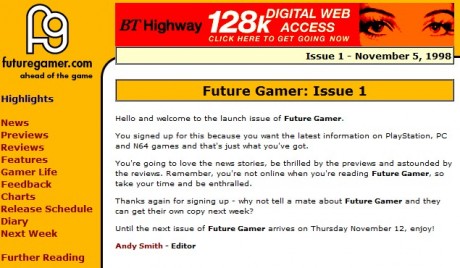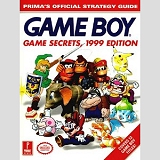Sometimes it’s horrible being right
I was scurrying around in the WoS Archives this evening looking for something else, and I stumbled across this. It's a piece from April 2000 for now-defunct games-industry trade paper CTW, in which I interviewed Andy Smith of Future Gamer, the email magazine that eventually evolved into GamesRadar.
Marvel through your tears, viewers at the eerily accurate foretelling of the state of games journalism that was about to unfold.
——————————————————-
Keen netwatchers were a little surprised a fortnight ago, when the Future Network announced the closure of its flagship "publication", the weekly email games magazine Future Gamer. Despite the huge amount of promotion for the FG brand over the 18 months of the mag’s life (Future spent hundreds of thousands of pounds advertising FG in its print mags and elsewhere), the magazine and its associated website are now to be swallowed up into Future’s successful American operation, Daily Radar.
I spoke to FG’s erstwhile editor, and the new Associate Editor of Daily Radar UK, Andy Smith, and attempted to find out a little more about the future of games-magazine publishing. And the first thing I found out was that the weekly email mag wasn’t necessarily dead at all.
"We’re going to be doing the same thing they do in the US, which is Daily Radar "blips", little text emails about what’s on the site that day, that you can choose to have or not. The final decision to abandon the whole idea of a weekly email mag is still up in the air, but if it comes back it’ll be as Daily Radar, not Future Gamer. It remains to be seen if we have the resources to do it, but I really hope we do, because there’s a huge demand for it"
Really? Surely the weekly mag was stopped because there wasn’t the demand for it?
"When we first started we had a massive sign-up, about 150 people a day. But when we started up the website, because Future want to drive web traffic, and people then just stopped signing up for it. We kept a core of just over 20,000 – very few people ever unsubscribed – but it stopped growing more or less as soon as the website opened."
"People never really grasped the idea that we wanted them to actually sign up for the weekly email, to drive up the numbers and attract the ad revenue. For example, Jim went up to Bizarre Creations the other day and met someone who said ‘Oh yeah, I love Future Gamer, I get it and then email it to everyone in the company’. And we’re like, oh, great, that’s another 40 people who could have shown up on our figures but won’t. But that’s what a lot of people were doing, and it didn’t do us any favours. It’s strange, because it’s not like it saved anyone any time, and you’d have thought people would rather get their own copy sent to them directly, but there you go."
It’s slightly odd, though. The model for Future Gamer was Football 365, which does much the same thing – it sends out a regular email mag, but there’s a lot more stuff on the website, and the website is updated continuously. Yet the actual email magazine bit goes from strength to strength. And you’d think gamers would be more likely to be into the idea of an Internet mag than football fans.
"I really don’t know. Yes, you’d have thought everyone would be into it, it’s perfectly targetted, narrow and deep, and the audience is technology-literate. When we started it up, I really couldn’t see why it wouldn’t get literally millions of subscribers."
Could it be, in fact, that today’s gaming audience simply aren’t interested in the idea of a magazine as such at all? It’s looked for a while like we’re moving towards a situation where people just want the information, they have no interest at all in the presentation of it, or the quality of that presentation.
"Absolutely. They don’t even want an interesting read, or a well-written read. It could literally be ‘News story – Final Fantasy 9 – movie – here’. Certainly with the younger gamers that’s true. I think the older gamers appreciate it a bit more. Future Gamer’s average reader was early 20s, and I think they’re more interested in having something thought-provoking, well-written and entertaining, whereas your 12-year-old Pokemon fan just wants to know the media blip and that’s it. Most of them probably wouldn’t recognise a good bit of writing anyway."
This sounds like a dream come true for publishers. Employ a few hacks, collate some press releases, practically no production costs, no physical costs, no returns from shops… But where does the profit come from? Surely Internet advertising still isn’t that lucrative?
"The American side has actually been extremely profitable. Thing is, there are different revenue streams – you’ve obviously got the advertisers, but you’re also providing content for other companies like AOL, and you’ve got your retail partners, all that kind of stuff. I think the major income from the American one is their being tied up to Babbages, the software retailers. Babbages paid them a ridiculous sum to say ‘You’ve just read the review, now click on this link to buy the game online’. So that makes Future a lot of money too, because they also get a percentage of every sale that Babbages make that came from Daily Radar."
Isn’t there a pretty obvious conflict-of-interest situation there, though?
"There is a potential conflict of interest, yes, but one thing I think Future’s done, most of the time, is retain its editorial integrity. As you know, we’ve always been separate from advertising, although of course there is the temptation to say ‘Ooh, let’s talk this one up a bit so it sells loads of copies.’ But then, I’ve also seen many many exclusive front covers of games that get 90% in one print magazine and 50% in every other one, and you could argue that that’s doing the same kind of thing. It’s much less direct, and much less obvious, but I’m not sure it’s a million miles different. As long as people who write the magazine are made aware of what editorial integrity is – and as long as they’ve got it – then I think it doesn’t just become an advertising vehicle."
By now, though, viewers, your correspondent was already shaking in fear. The fact is, the Daily Radar business model is just too good for publishers to resist. Their content is delivered on a plate for free by the games companies, the costs involved are trivial, and – crucially – by tying reviews financially into direct retailing, the only way the gravy train can be derailed is if reviewers start slagging the games off. And as can be seen in the clearly visible softening of reviewing policy in (particularly) Future’s print magazines over the last couple of years, that’s not going to happen. A more cynical man than your correspondent could believe it had been planned that way all along.










Isn't this what happens to all industries though? It's almost a race to the bottom as businesses strive to make more and more profit by whatever means they can, usually by doing stuff as cheaply as possible. Take Big Brother or X-Factor, or The Sun. The root cause (as said in the interview) is that people get what they want. However, all it takes is another fresh company to start up with a high quality product and suddenly everyone realises what they've been missing all this time. Unfortunately, the cycle will just start again though.
"As long as people who write the magazine are made aware of what editorial integrity is – and as long as they’ve got it – then I think it doesn’t just become an advertising vehicle."
I wonder if Andy had his tongue firmly in his cheek when he wrote/said that?
Holy shit…128K digital web access? Sign me up! I can't wait to see what the web looks like in digital!
"However, all it takes is another fresh company to start up with a high quality product and suddenly everyone realises what they've been missing all this time"
That's a hope that people have clung to for many years, and which sadly isn't supported by any evidence. As it turns out, and as Future had just begun to realise in 2000, most consumers are happy to lap up total shit as long as it comes thick and fast.
Just look at what happened to Maximum. Detailed, massively in-depth coverage that the entire team seemed to be genuinely enthusiastic about. It lasted, I think, six issues.
What we really need is a sugar-daddy, someone who can fund a video game review site in perpetuity without the need for advertising, to employ professional editors and writers freed from the corruption of corporate sponsorship and approval, to give the public what they need rather than what they want.
Failing a sugar-daddy, maybe a KickStarter would do?
Failing a KickStarter, perhaps we could set up a charitable foundation?
Who am I kidding. The world's moved on and has chosen a poorer, lower quality future. Our heroes of the gaming press past are mostly gone and forgotten (I understand J Nash was actually swallowed by an absurd black-hole, emerged the other side and subsequently makes a living selling top hats in a shop that refuses to sell top hats) and our last chum, Stu, has all but given up on the gaming world altogether.
And we did this. We supported the advertisement-funded, low-brow, un-challenging, lowest-common-denominator, 9/10, Top Awards for a Shit Game media. We made it happen, perhaps unwittingly, but we made it happen.
God. That's more depressing than Dan Whitehead's review of Braid. Sorry.
I don't know if it's because the newer generation of gamers outnumbered the old massively with the boom of the industry or if the older ones simply gave up on the concept of magazines and reviews altogether. I'm more in the latter although I gave up on mainstream gaiming too. With my ability to fund games I like through alpha funding or kickstarter projects I can guide it from the earliest stages, the massive amount of content on the net means there's more to sample than I have time and opinions are like arseholes, but at least thanks to forums and the choice of gaming circles online I can fine ones that are more tolerable than others.
Most games journalism hasn't been worth paying for for many years anyway. Not as entertaining as it was and the reviews are crap or lead you into blowing £30-40 on some shit stain on a disc. That's why I trust friends and online buddies with similar tastes more.
These words come to mind, Lenny:
But I'm tired of hearing from sneery little cowards. strawberry float all of you chickenshit "Anonymous Knights", and anyone else with such tiny shrivelled balls that they won't attack people to their face.
Although your name may well be Lenny in which case, well done. However, if so, I think your rabbit went the other way. (I suggest you call him George.)
Moving on, it's not really of any surprise at all the games journalism died in a ditch. The hardcore crowd have come to define themselves almost totally, and to a man, in defiance of casual encroachment on their 'hobby'. Therefore all they want is impenetrable, meat-and-two-veg classically joypad controlled (or, if PC gamers, click on numbers to see stats bullcrap) that will bamboozle everyone else and keep them out of their play-pen. Or off their hobby-horse. Whatever.
Their idea of a good review? "Tell me if it is like X, that famous game that I played online and liked, which had very few casuals. Also, does it support full 1080p HD, 5.1 Dolby Surround Sound, and smell of beef on Sundays? Finally, will I have to adapt my gameplay strategies in any way, or can I just circle-strafe like I like? Thanks, ta." Essentially, their ditch is an odd mix of the-same-as-ever-but-with-superior-technology.
Sadly, the plot of Star Wars, even on crisp remastered Blu-Ray, is still just an enjoyable fairy tale in space with realistically folklorish incestuous themes.
The casual crowd? They want games they can play easily and enjoy doing so. At least they don't cynically purchase on a treadmill of selling everything back second hand so that they can purposefully by shitty games only to review them negatively to everyone in ear shot.
The place of good journalism in all of this? Good journalism is, arguably, dying everywhere. Why expect it in games?
'Their idea of a good review? "Tell me if it is like X, that famous game that I played online and liked, which had very few casuals.'
Even that might be giving them too much credit. It seems it's increasingly becoming "reinforce my opinion on this thing I haven't played". Oh, and "you better not stray too far from the Metacritic average". Pretty much a lost cause.
…And the suckers–err, consumers, are perfectly happy with this outcome. Even back in the '90s, readers of video game magazines and websites were interested in two things: When is the Next Big Game Coming, and Where Are the Cheat Codes? They want toy commercials and validations, that's what they'll get.
The bitter irony is that the internet enables anyone to become their own publisher and be heard around the world, but there's absolutely no money in it. For writers, your only paying option is to play the low-rent stooge for the industry. But, when you think about it, the whole world is devolving into a world corporate feudal state, and the peasants show no sign of rebellion. You get the government you deserve, and war is over (if you want it), and blah blah so on and so forth.
Another aspect of this problem is that some review websites' entire business model is charging for "reviewing", and make no secret of it. I'm often getting spam from various websites where for only $50 I can have a favourable review of one of my Android apps. It seems the line is now completely blurred between "reviews" and "marketing".
I saw some stuff about that come up at Craig's blog a while back, and it does seem to very much be a thing now. Aside from the straight-up "pay for a good score" type you mentioned, there's also places where you can pay to get bumped up the queue, and though a score isn't guaranteed, they won't print it if it's going to be negative.
Seems it's becoming very common with app review sites in particular, using the whole iOS gaming boom to set this shady shit in stone. Man, we could use Podgamer right about now.